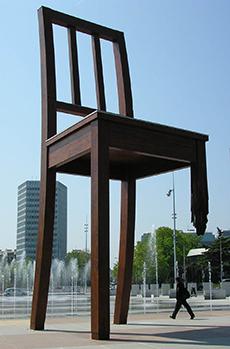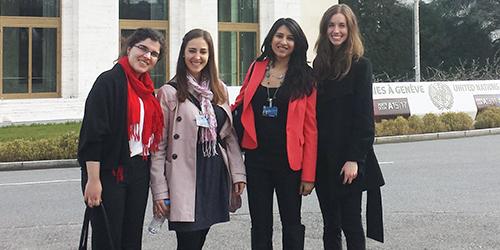Back from Geneva, Columbia Law School Students Report on Human Rights Advocacy at the U.N.
New York, May 15, 2014—Four Columbia Law School students who recently traveled to Geneva to advocate for greater support for U.S. human rights initiatives before the United Nations Human Rights Committee discussed their experience in an April 28 presentation at Jerome Greene Hall. The students participated in the trip as part of their work with the law school’s Human Rights Clinic.
| The students visited Broken Chair, the iconic Geneva monument symbolizing opposition to cluster bombs and land mines. |
In March, Paula Ximena Mendez Azuela ’14, Sara Osama Kayyali ’14, Ami Shah ’15, and Caroline Stover ’14 accompanied Human Rights Institute (HRI) Executive Director Risa Kaufman and Associate Director JoAnn Kamuf Ward to Switzerland to attend a session of the committee, which was conducting a high-profile review of the United States’ human rights record. There, the students conducted advocacy related to reports that the Institute had submitted to the Committee, urging greater access to counsel in civil cases and enhanced federal support for local and state initiatives to protect human rights. The students also participated in a meeting with a delegation of high level U.S. officials prior to the review.
The U.N. Human Rights Committee consists of 18 independent experts who review signatory states’ compliance with obligations under the International Covenant on Civil and Political Rights (ICCPR), one of two multilateral human rights treaties that comprise the “International Bill of Rights.” The U.S. government recently nominated Columbia Law School Professor Sarah H. Cleveland, faculty co-director of HRI, to join the committee.
During the session, civil society—advocates, NGOs, and other stakeholders—had opportunities to observe U.N. proceedings, meet with committee members and U.S. representatives, and follow up on recommendations previously submitted in “shadow reports” that offer independent insights into various human rights concerns. Including the two reports issued by HRI, 179 shadow reports accompanied the U.S. review. Interest was so high that the session was extended an extra afternoon.
“There were a variety of opportunities for advocacy,” Stover said. “Civil society could get attention for issues, meet decision makers, and go more in depth.”
The U.S. Human Rights Network helped coordinate and organize attendees for effective presentation, and the students found that advocates pursued a range of strategies in arguing for their causes.
“Some advocates were conciliatory, suggesting ‘we’re on the same team, let’s work together,’” Kayyali said. “Others were more adversarial and confrontational.”
While many in Geneva were disappointed that the U.S. delegation did not reverse its position on extraterritorial reach of the treaty, the students said they were impressed with the expertise of both committee members and advocates. The review touched on numerous issues related to U.S. policy and practice, including criminalization of homelessness, NSA surveillance, gender equality, and immigration.
“Having all of these actors in the same room was a catalyst for important debate,” Stover said.
| Sara Osama Kayyali '14, Paula Ximena Mendez Azuela '14, Ami Shah '15, and Caroline Stover '14 attended a session of the United Nations Human Rights Committee in Geneva. |

